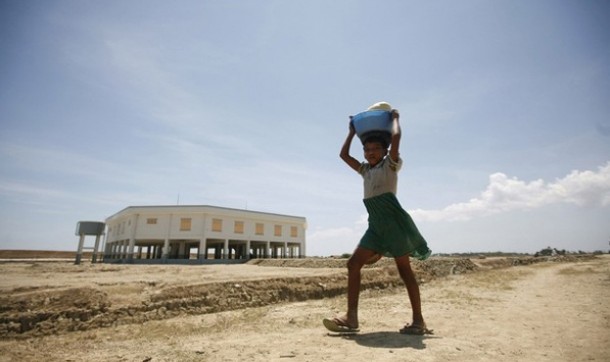As Burma attempts to rebuild after the decades of neglect, two studies warn that the country also needs to build defenses against natural disasters like Cyclone Nargis and guard against environmental calamities.
Burma is one of several countries in Southeast Asia at risk of serious environmental crises devastating their economies, says business risk assessor Maplecroft.
Ten nations in Asia—including neighbors Bangladesh and India—were identified as having little capacity to withstand natural disasters.
“High exposure to natural hazards in these countries are compounded by a lack of resilience to combat the effects of a disaster should one emerge,” said UK-based Maplecroft.
Burma is one of the countries with “the greatest proportion of their economic output exposed to natural hazards,” according to the study.
“In addition, they also demonstrate poor capability to recover from a significant event exposing investments in those countries to risk of supply chain and market disruptions,” said Maplecroft. “This could lead to sizable business interruption costs, in addition to material damage to essential infrastructure.”
In a separate study, the Asian Development Bank (ADB) warns that East Asian countries must act now to avert natural disasters engulfing their mushrooming urban populations by adopting more renewable energy systems and clean-air technologies.
Asia is urbanizing at a faster rate than anywhere else and is now home to almost half the world’s city dwellers. By 2020, it will have 21 of the world’s 37 megacities and over the next 30 years another 1.1 billion people are forecast to be living in metropolises, said the ADB study.
“The region will be confronted with even greater environmental challenges that are already serious, including air pollution, congestion, carbon dioxide emissions, deprivation in water and basic sanitation, plus growing vulnerability to natural disasters,” said the ADB.
Just as Burma seeks to emerge from dilapidated isolation and encourage investment in new infrastructure for electricity generation and transport to catch up with other Southeast Asian countries, the ADB warns that many “sophisticated” cities in the region face a decline in living standards due to air pollution caused by excessive traffic, industry and coal-burning power plants.
“Particularly disturbing are urban carbon dioxide emissions, which if left unchecked under a business-as-usual scenario could reach 10.2 metric tons per capita by 2050, a level which would have disastrous consequences for both Asia and the rest of the world,” said the report.
To avoid a decline in living standards and health as well as avert urban disasters, Asia must follow a green urbanization path to “promote the use of new technologies and renewable energy,” the ADB said.
“Asia must incorporate environmental priorities in city planning. This is underway through building new and satellite cities with renewables as primary energy sources, as piloted in [China],” the ADB said.
The natural disaster risks faced by Asian countries are made worse by their economic fragility, said Maplecroft.
“Some of the highest risk countries have substantial economic outputs, but they are fuelled by large, poor populations, many of which live on marginal land such as flood plains, leaving constituent workforces at heightened risk and without the necessary resources to re-establish themselves in the aftermath of an event.”
Burma’s worst natural disaster, Cyclone Nargis, only occurred in May 2008. It killed at least 138,000 people and caused devastation in the Irrawaddy Delta region which has still not yet fully recovered.
Without infrastructure in place to respond to similar calamities, Burma’s ambition to become a major rice producer and exporter remains in serious jeopardy, the studies’ researchers say.
Maplecroft highlighted that even Burma’s more developed neighbor Thailand suffered serious financial losses and disruption when severe flooding inundated both industrial zones and rice paddy around Bangkok in 2011.
The flooding reduced Thailand’s GDP by nine percent and the economy is still suffering one year on.
“The floods also affected the operations and supply chains of multinational companies, with the automotive industry and ICT sectors hardest hit—manufacturers of hard-drives were only able to meet two-thirds of demand in the final quarter of 2011, pushing prices up by up to 55 percent,” Maplecroft cited as an example of the knock-on effects of natural disasters.
“The test for emerging and developing economies is to build a stronger capacity to meet the challenge of hazard-prone environments,” said Maplecroft’s Helen Hodge. “Failure to do so will risk their ambitious economic growth when the inevitable natural hazards strike.”
The ADB suggests that Burma is ideally positioned to benefit from the mistakes made by more advanced economies in Southeast Asia where “breakneck expansion has been accompanied by a sharp rise in pollution, slums and widening economic and social inequalities which are causing rapid environmental degradation.”
So with the advantage of hindsight, Burma is in a position where it could avoid these problems by directing measured and sustainable development. The bank’s report urges governments to invest in less polluting technology and infrastructure and to focus on energy-efficient urban buildings to reduce electricity demand.
“For urbanization to be not only green but inclusive, policymakers need to promote climate-resilient cities, in order to prevent disasters like the 2011 Bangkok floods,” says the ADB.
The report recommends that governments should promote climate change-resilient cities—including building homes in safe areas, make housing affordable for the poor and investing in drainage infrastructure and weather forecast technology.
The speed of urbanization in Asia—a problem which seems certain to confront Burma as investment flows into Rangoon and Mandalay—shows no sign of slowing. Within the next 20 years another 110 million people will be living in cities across the region at risk of flooding, raising the total in danger to 410 million people.
“Asia has seen unprecedented urban population growth but this has been accompanied by immense stress on the environment,” said the bank’s Chief Economist Changyong Rhee. “The challenge now is to put in place policies which will reverse that trend and facilitate the development of green technology and green urbanization.”

















